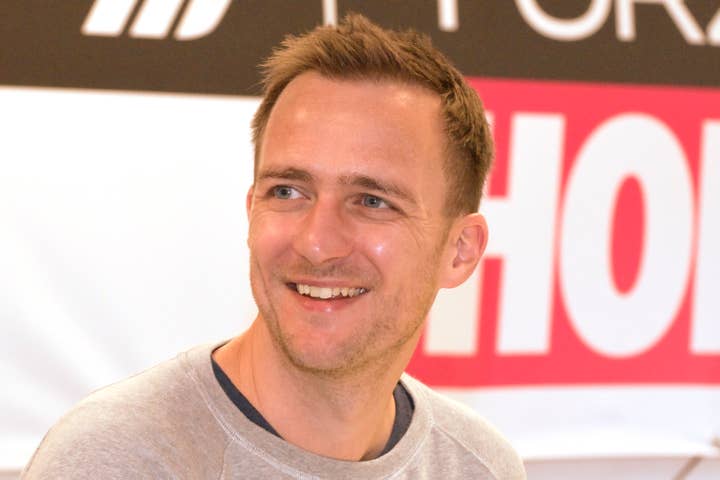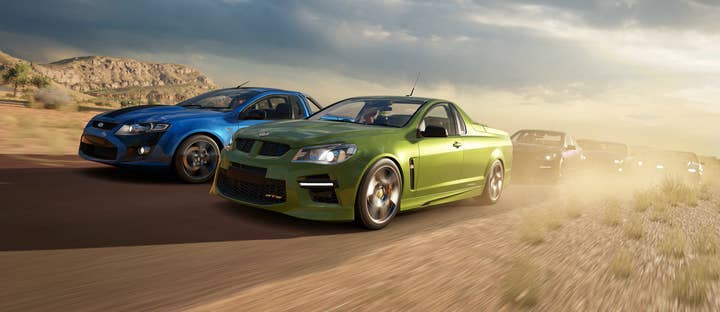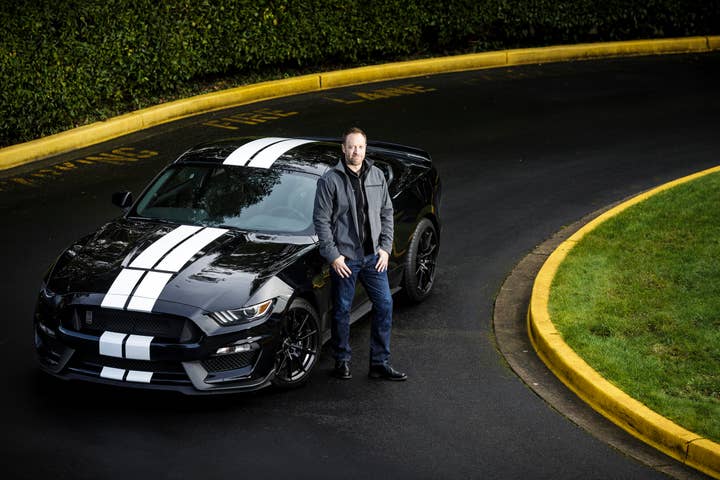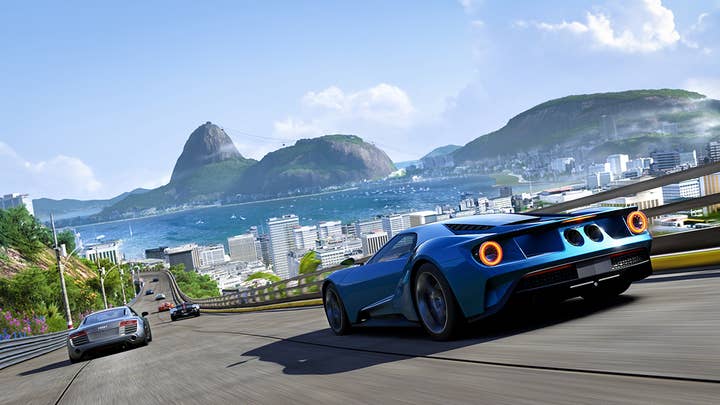How Forza overtook Need for Speed to become the world's biggest racing IP
Playground and Turn10 directors discuss where the series goes from here
E3 2010 was the one where Microsoft detailed all its plans for Kinect, it was the one where Sony ended on its press event with Twisted Metal, and the expo where Nintendo fully unveiled the 3DS. It was also the one with that terrible Konami conference.
Yet, true to form, the real stories were emerging away from the big glitzy showpiece events.
While all that was going on, Forza creator Turn 10 was meeting a newly formed games developer called Playground at The Palm restaurant - a steakhouse just around the corner from the E3 show.
"We met these gentlemen from the UK that started pitching us on some ideas for a racing game," recalls Alan Hartman, Turn 10 studio head.

"That has just been a huge moment in the franchise; when you think of the success across our history, that was the point - with Forza 4 coming out around that time - when we were really hitting our stride. Playground came in and this generation has just been fantastic."
"That was still one of the worst steaks that I have ever had," adds Playground's creative director Ralph Fulton.
"Don't say that," responds Hartman. "We still go there."
"It wasn't because it was a bad steak, we were just so nervous," remembers Fulton. "And since that meeting, a very strong relationship was formed. We were right at the start of the Playground journey back then. We still pinch ourselves that we are here today and in this position. I was a fan. I still have a Forza Motorsport 3 key ring on my car keys."
Gavin Raeburn, CEO and studio director at Playground adds: "We actually got the wrong day. There was a mix up with the calendars, so it would have been a bit of a miss."
Fulton: "Oh yeah, a real sliding doors moment there."
Towards the back of 2016, the games media - including us - devoted plenty of column inches to the performance of certain games in the marketplace. You won't have to look back far to find negative headlines around the early sales of Call of Duty: Infinite Warfare, or Dishonored 2, or Titanfall 2, or Watch Dogs 2.
Yet there were other titles that went the other way and performed beyond what was expected of them, and Forza Horizon 3 was one of them. Its 91 on Metacritic makes it one of the Top Five highest rated games of the year. It shifted more than 2.5m units in just three months and was one of the Top Ten best-selling games of the year in the UK.

"There was a moment, probably in July time last summer, where I took a build home and played it," remembers Hartman. "Typically I sit there with my notepad and scratch a bunch of feedback to give to the teams. After playing the game for a while, I realised I had only written one note... and I ended up crossing that out and not even sending it. The product was just singing at that point, and it was clear that the quality, the craftmanship, the polish... it was just incredible. We knew back at E3 we had a great game; we knew before that. But that was the moment for me, in about July, when I realised the bar it was going to hit."
Raeburn agrees that he knew the game was going to be well received, but was stunned by the eventual scores. "We were expecting high 80s on Metacritic, so to get 91 was fantastic. And the sales... they have been greater than any of us had hoped for."
The performance of Horizon 3 fired the Forza franchise into that exclusive $1bn club, which it has achieved over 9 games and 11 years. Today, it is the market's most popular racing franchise, a crown previously held by the likes of Gran Turismo and Need for Speed. Yet, what's perhaps most impressive is not so much the sales numbers, but the franchise's level of consistency. With the notable exception of Forza Motorsport 5 (which was still rated highly, just not at the usual level), every Forza title has achieved either a high 80 or low 90 score on Metacritic. Commercially, the brand just seems to be getting bigger with each passing title. That's quite an achievement in a notoriously tricky genre, where games can over-perform and under-perform without any clear understanding as to why (just look at titles in the various F1 or Need for Speed titles). One popular theory is that gamers don't buy many racing games per generation - perhaps one or two at most. However, we now have four Forza titles on Xbox One that say otherwise.
"I've heard that kind of chatter in the industry around 'the demise of the racing genre'," Hartman says. "I just don't buy into it. When you look at the history of the genre, Gran Turismo - the grandfather of racing sims - it came in and did huge numbers. It was the No.1 selling franchise. Then there was the rise of Need for Speed, especially during the last generation and the generation before. You can look at those two franchises and where they are right now and say: 'Well, we've had a decline in the racing genre'. But at the same time, we've done great in the last 15 years. We've been growing the franchise, growing the business."
"At the launch of Xbox One and with Forza Motorsport 5, we really tried to hit the reset button on how we thought about building our games"
Dan Greenawalt, Turn 10
Turn 10 creative director Dan Greenawalt continues: "At the launch of Xbox One and with Forza Motorsport 5, we really tried to hit the reset button on how we thought about building our games, and who we thought our customers were. [We] and Playground [looked at] how we talk to our players and why they're playing. We do that more than look at the competition. The mantra we had was 'shaping the future of automotive entertainment'. We care deeply about cars and car culture, and we care about games and the genre. So rather than thinking about it as a competitive set, we really started to think about where we wanted this to be in four or five years, and what steps do we take creatively to come up with new features like Rewind, Green Line, ForzaVista, Forzathon, Blueprint... there's great technology coming in both games. There's innovation across the boards that both games benefit from. That ideation is coming from a different place than what people expect.
"I get asked a lot about competitors and the genre and what have you. [For us] there's hardly any inspiration coming from that space - it's all coming from our longer term vision."

So Greenawalt isn't inspired by his competitors but rather the 'longer term vision'... but where did the inspiration for that vision come from then?
"We have a confidence that our process, and our creative minds, and the influx of new industry talent, will continue to bring new ideas in," he says, going further.
"I will say that some of the secret of that is to broaden our horizons beyond racing, look at other genres and games, deconstruct them constantly... but also look beyond games entirely. We want to look at what our players are interested in beyond just gaming. When I say that I want to shape the future of automotive entertainment, we need to be looking at the automotive industry. We need to constantly look, and we do, at how we partner with the industry. That means working with the automotive industry in a way that other genres just don't or can't. We have been able to partner with McLaren, Ford, Lamborghini, in ways that have surprised me.
"By having a collaborative process with our own teams first - us and Playground - we are bringing through new talent... And then collaborating with these other broader teams, such as Lamborghini's design team or Lamborghini's technology team, and even race teams like Audi who we have worked with in the past, this further boosts and accelerates the ability to come up with new ideas."
Both Greenawalt and Hartman say the introduction of Playground has changed things entirely for Forza. It was Turn 10's idea to develop a Forza spin-off franchise, and they had clear ideas over what that might look like, but then Playground went off and delivered something altogether more unexpected.
And this relationship is different to how, say, the Call of Duty teams work together. Those studios report to Activision, whereas Playground report into Turn 10. As a result they share ideas, technology and even processes.
"It is not your typical publisher/developer relationship because Turn 10 is a developer as well," Raeburn says. "We speak the same language. We work with the same tech base."

Hartman then adds: "You wouldn't believe that these two teams are half a world apart."
Greenawalt goes further. He explains how the technology and new features each team introduces becomes iterated upon, altered or just taken wholesale for the next team's title. Yet more than that, working side-by-side with another studio has even fundamentally changed how the studios behave.
"We have never had to explain Forza Motorsport to another group," Greenawalt says. "But Playground had to communicate Horizon - something they understood intuitively - to someone new. And although we speak the same language, you are having to explain a concept that has an emotional tone to it. Through working with Playground, we understood how to communicate better. We started adopting new processes for how we talk about tone, look and feel more broadly."
The reason Horizon existed, Greenawalt later explains, is that they looked at who they were missing with the Forza Motorsport series. The game appealed to people that liked cars and hardcore competition, but wasn't quite so appealing to those who were more keen on exploration.
Yet, what has surprised both teams is the sheer number of Forza fans that invest in both sub-brands.
"When you look at the pure motivations of players, you can sort of extract it from the racing genre and start looking at things like exploration, competition, single player vs multiplayer... and not just what they want to do, but why they want to do it," Greenawalt says. "When you get down to that level, you won't be very surprised to find that people who like cars, and like open world exploration, gravitate towards Horizon. People who really like hardcore competition and like cars, they gravitate towards Motorsport.
"But then you have this massive group that just goes towards both, because they like playing with a community who like cars. It is a lot more simple than... what I hear a lot is people talking about are sub-genres, and whether things are sims or arcade-style games, and a whole lot of things that just doesn't prove out in the motivations of our players, nor in the numbers. We have a tremendous number of players playing both."

Does that mean that Forza's biggest competitor is Forza? And if so, does it make sense to release a new one every year? Today's industry is one dominated by service-based games - Forza is no exception, with its regular DLC and eSports activity. Looking at least year's Call of Duty, and tracking the market data, it was clear that its biggest competitor was the previous year's Call of Duty. With that in mind, does it not make sense for Turn 10 to hold off on the inevitable Forza Motorsport 7 and instead invest in supporting Horizon 3 and Motorsport 6 further?
"You could say that we have two games right now, in the same franchise, that are competing with each other"
Dan Greenawalt, Turn 10
"There is actually a lot of community activity in both Motorsport and Horizon going on simultaneously," Greenawalt acknowledges. "We have some players that are in both communities and some players that are in either one or the other. The Forza Racing Championship is an eSports series that we are running in Forza Motorsport and it is complementary to Forzathon. We can do things in Forzathon that talk to Forza Racing Championship, and in Forza Racing Championship we can talk about expansions like [DLC] Blizzard Mountain and point players that way. So in some ways, you could say that we have two games right now, in the same franchise, that are competing with each other, but also helping each other.
"You can look at the whole thing and say it is a microcosm of the whole racing genre. New games will come in and move out, but it is hard for people to see how many players are playing racing games, because people will be playing these games for several years.
Hartman adds: "We are always releasing - whether it is a car pack, or a Forza Racing Championship event, or a Forzathon event, or an expansion. We - both teams - are actively engaged with working with the community and releasing all the time.
"Even as we evolve into service, and I would actually say we are a service today, I think those big releases are still important"
Alan Hartman, Turn 10
"At the same time, the big game releases are more important in terms of them being the marketing event. We get to go to E3 and talk about what we're doing, and the innovation and try and reinvigorate the community. That is an important part of building the franchise and the community around it. Even as we evolve into service, and I would actually say we are a service today, I think those big releases are still important."
It is particularly important for Microsoft. It's easy to forget that the motivations for a first-party developer is quite different compared with a third-party one. Forza is one of Xbox's biggest brands and Turn 10 one of its best internal studios (and by extension, despite being independent, so is Playground). Turn 10 was one of the first developers that experimented with Kinect, the firm's technology director is involved with DirectX and the studio has direct input in the hardware Microsoft produces. Greenawalt wouldn't confirm anything - "I love my job and would like to keep it," he says - but you'd be surprised if Turn 10 hasn't been playing with VR and HoloLens and Project Scorpio. Playground, too, gets access to all these toys (Fulton calls it a "Ridiculous level of access"). That's another reason why regular Forza releases are important, because they showcase Microsoft's latest tools and technology.

This first-party element changes the perception of the competition, too. Forza Horizon 3 was successful for many reasons, including the fact it had next to no rivals in the marketplace. It was a year where Forza had the genre practically to itself.
2017 is different. There's Gran Turismo and Need for Speed and Project CARS 2; there's off-road racers like Dirt 4, and more casual titles like Micro Machines and Mario Kart. This year is a very congested and competitive 12 months for driving games.
I've pointed that out to several racing studios this year and the response is always the same. They'll tell me how it's good for the genre because it generates excitement, and I rarely believe the answer. We've seen time and time again what happens when you release too many similar games too close to one another.
Yet with Turn 10, although the answer was the same, it's more believable. Because competition is typically a good thing for a platform that wants to been seen as the home for that particular genre.
"We will be probably sitting here in a year from now and talking about the perceived resurgence of the racing genre, because of the number of sales that we have seen across all these titles," Hartman concludes hopefully. "Great games will find great big audiences. It maybe tough occasionally for small titles to get attention, but as part of being first party and part of the Xbox platform, I welcome them in. I want them. I love the Assetto Corsa team, I love what they're doing and the perspective they are bringing in and I'm excited for what they do next. I would rather be having this conversation about a load of great racing games coming out this year, than you saying that there doesn't seem to be any."
